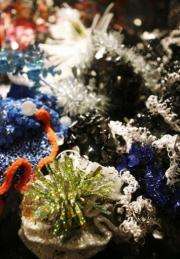Crocheted coral exhibit carries environmental warning

From afar, a casual viewer could mistake the coral reefs on display at Washington's Natural History Museum for the real thing, but in fact, it's colorful crochet artwork with an environmental message.
The exhibit is the work of some 800 women, and a few men too, who hope to draw attention to the plight of the world's coral reefs, which face stress, degradation and outright extinction because of damaging human activity.
Participants ranging in age from three to 101 years old responded to a call for project volunteers by organizers Margaret and Christine Wertheim, Australian activists with the Institute for Figuring.
The results are captivating pieces of work -- barriers of coral that stand three meters (yards) tall, with multicolored strands of wool that mimic the curves and curls of coral, anemones and starfish.
Fluffy stubs with threads in red and green site next to pink and purple structures with curling edges that seem to undulate as they would in the water deep beneath the ocean's surface.
The exhibit is entitled "Hyperbolic Crochet Coral Reef," a reference to the hyperbolic geometry of coral, which has so far proven impossible to reproduce physically except through the medium of crochet, organizers say.
"We like to surprise our visitors. You don't expect to see crochet... in a Natural History museum," said Barbara Stauffer, chief of temporary exhibits at the Washington institution.
"It's a good way to raise awareness. I learned how to crochet. I made three very small pieces I hope are tucked somewhere and I'm going to spend the next few days trying to find them," she added.
"Twenty percent of the world's coral reefs have been destroyed in the last couple of decades," pointed out David Stuart, deputy chief of mission at the Australian embassy in Washington, as he opened the exhibit.
"If we go on like this we will lose the reefs, particularly the very colorful reefs in tropical waters."
Coral reefs worldwide face multiple threats from human activity, including global warming, which raises the ocean temperatures to dangerous levels, and acidification, which can bleach and kill coral.
Overfishing and pollution also threaten the survival of the delicate ecosystems, which could disappear altogether over the next four decades, experts warn.
"The reefs that I studied 35 years ago have largely vanished and most reefs may well be gone by the end of the century of sooner, if nothing is done to protect them," said Nancy Knowlton, a professor of marine biology at the Smithsonian Institution.
"This project is a stark reminder that if trends continue, an exhibition like this may someday be the only way for people to experience the beauty of coral reefs."
The exhibition, which runs from October 16 to April 24, 2011, carries a serious and sad message about the state of the world's coral reefs and the negative effects of human activity.
But Margaret Wertheim said the creative and unusual pieces also offer a positive message about what can be produced by people working in coordination and collaboration towards a common goal.
"The reef project is a giant explosion of feminine energy, a testimony to what women can achieve when they work together."
(c) 2010 AFP
















